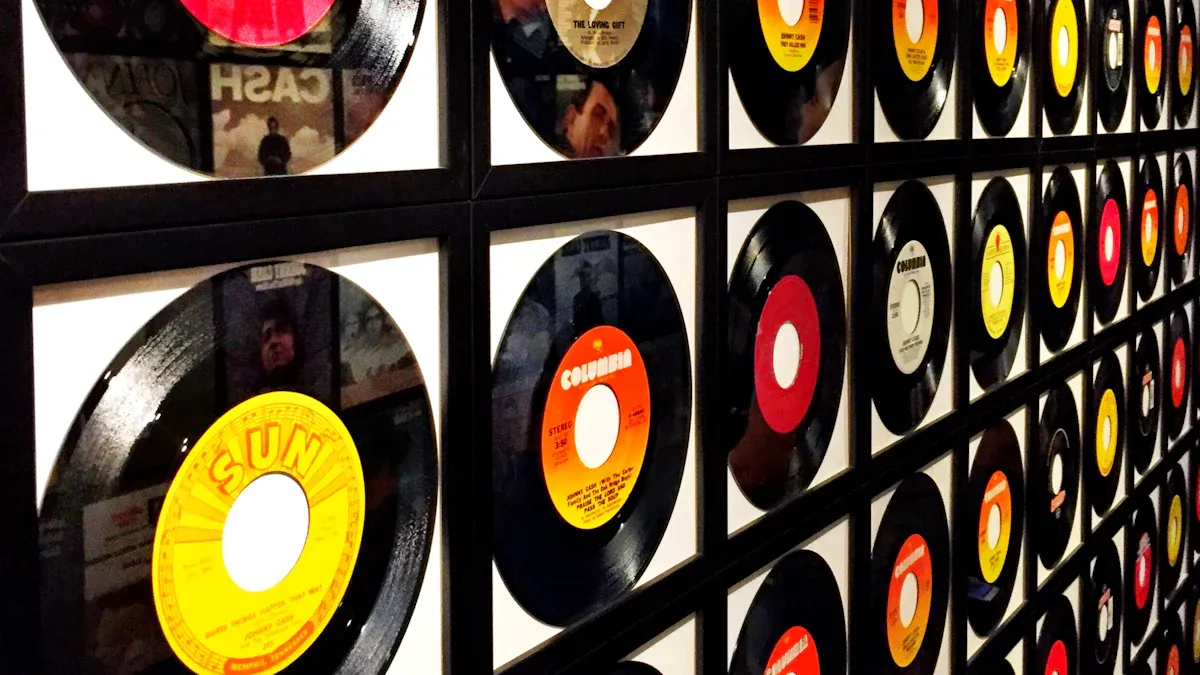
With small record labels, you gain personal attention, creative freedom, and a higher share of revenue. You may lose out on big budgets, wide promotional reach, and major industry connections. Independent labels represent about one-third of the music industry market, while major labels control most of the remaining share. Artists often face smaller advances and higher financial risk, but many value control over their music and career. When you choose a record label, weigh these trade-offs carefully to align with your goals. In Esl Retail, small record labels sometimes use Electronic Shelf Labels and ESL Gateway AP to manage promotions and pricing, including ESL Price Tag solutions.
Small Record Labels vs. Major Record Labels: Key Differences

Exposure and Reach
Audience Size
When you sign with a major record label, you gain access to a massive audience. These labels control a large share of the global market and have the power to push your music to listeners worldwide. Their financial resources and specialized teams allow them to invest heavily in marketing, playlisting, and collaborations. This often leads to greater exposure for artists. In contrast, independent labels usually serve niche markets. You may receive more personalized attention, but your average audience reach will likely be smaller. Independent labels help you build a dedicated fan base, but they rarely match the scale of major label exposure.
Media Coverage
Major record labels have established relationships with top media outlets. They can secure interviews, features, and radio play for their artists. This level of media coverage boosts your visibility and can accelerate your career. Independent labels, however, often lack these connections. You might find it harder to get featured in mainstream media. Instead, independent labels focus on grassroots promotion and digital platforms. You may see your music covered by blogs or independent radio, but national or international media exposure remains limited.
Resources and Support
Financial Backing
Major record labels offer substantial financial support. They provide large advances, fund high-quality recordings, and cover touring expenses. This backing gives you the freedom to focus on your music without worrying about upfront costs. Independent labels operate with smaller budgets. You may receive a modest advance or need to invest your own money. Some independent labels use profit splits or joint ventures with majors to access better distribution or marketing, but the financial resources remain limited compared to major labels.
Marketing Muscle
You benefit from the marketing power of a major record label. Their teams handle promotion, branding, and global campaigns. This support can lead to viral success and international recognition. Independent labels rely on creative strategies and grassroots connections. They may offer faster turnaround times for releases and more artist-friendly contracts, but their marketing reach is smaller. You will likely need to take an active role in your own promotion.
Relationships and Culture
Artist-Label Dynamics
Your relationship with a major record label often feels formal and business-driven. These labels prioritize profit and may require you to sign long-term contracts that favor their interests. You might have limited creative control and receive a smaller share of royalties. Independent labels, on the other hand, value trust and personal relationships. You gain more creative freedom, flexible deal structures, and often retain ownership of your masters. Independent labels focus on your artistic vision rather than just commercial success.
Community Feel
Independent labels foster a sense of community. You work closely with label staff and other artists, building strong connections. This supportive environment helps you grow as an artist. Major record labels, due to their size, may feel less personal. You become one of many artists on a large roster, and your individual needs may not always receive priority.
Tip: Always review contract terms carefully, regardless of label size. Each deal is unique, and your long-term success depends on finding the right fit for your goals in the music industry.
What You Gain with Small Record Labels

Personal Attention
Direct Communication
You experience direct communication with independent labels. Small record labels often sign fewer artists, which allows you to connect with label executives and A&Rs without barriers. Platforms like Groover make it easy for you to submit your music and receive feedback quickly. You do not need to wait for long periods or rely on managers to reach decision-makers. Unlike major labels, which rarely accept unsolicited material, independent labels remain accessible and open to new talent. This direct approach increases your chances of discovery and signing.
- You submit music directly to label professionals.
- You receive guaranteed feedback within days.
- You target submissions to specific groups, such as media or mentors.
- You avoid ignored emails and long waiting times.
Note: Direct communication helps you build relationships and understand label expectations, making the process transparent and efficient.
Tailored Support
You benefit from tailored support when working with independent labels. These labels focus on supporting artists by providing hands-on guidance and personal attention. You do not feel lost in a large roster. Instead, you receive help with marketing, production, and career development that matches your unique needs. The smaller scale of independent labels allows staff to invest time in your growth. You gain access to resources that fit your style and goals, rather than generic solutions.
Independent labels foster closer working relationships. You collaborate with label staff who understand your vision and help you achieve it. You receive fairer revenue splits and more creative control, which leads to a more satisfying partnership.
Creative Freedom
Artistic Control
You maintain artistic control over your music with small record labels. Independent labels prioritize your creative vision and allow you to make decisions about your sound, image, and brand. You do not face pressure to conform to commercial formulas. Many artists, such as Emilie Autumn and Hanson, left major labels to regain creative control and found success with independent labels. You decide how your music evolves and what message you want to share.
- You choose your collaborators and producers.
- You define your brand and image.
- You decide on the direction of your releases.
Flexibility in Releases
You enjoy flexibility in releases with independent labels. You set your own schedule for launching singles, EPs, or albums. You do not need to wait for approval from large teams or follow strict timelines. Independent labels encourage you to experiment with new styles and formats. You can release music as often as you want, adapting to trends and audience feedback.
Artists like Teho from Labo T. created their own labels to prioritize quality and authenticity. You focus on artistic fulfillment rather than commercial success. Digital tools and platforms, such as Bandcamp and social media, give you control over distribution and marketing.
Tip: Creative freedom lets you innovate and connect with your audience on your terms.
Revenue Share
Higher Percentage for Artists
You earn a higher percentage of revenue with independent labels. Major record labels typically offer artists 13% to 20% of streaming royalties, while small record labels may provide up to 50%. You do not usually receive large advances, but you keep more of your earnings over time. This arrangement supports your long-term financial growth and independence.
| Label Type | Artist Revenue Share Percentage | Advance Payment Included? |
|---|---|---|
| Major Record Label | 13% to over 20% | Yes |
| Indie/Small Label | Up to 50% | Usually No |
Transparent Deals
You benefit from transparent deals with independent labels. These labels often split profits equally with artists, avoiding unfair arrangements. You receive clear information about how royalties are calculated and when payments are made. Tools like Infinite Catalog and cloud-based dashboards help you track sales, licensing, and expenses. You access your royalty statements regularly, which builds trust and collaboration.
- You receive timely and accurate royalty statements.
- You understand the value of services provided.
- You avoid hidden fees and deceptive practices.
Independent labels prioritize your financial interests and maintain transparency. You know what to expect and can plan your career with confidence.
Niche Audience Reach
Targeted Marketing
You benefit from targeted marketing when you work with small record labels. These labels excel at identifying and reaching your niche target audience. Instead of casting a wide net, they focus on specific listener groups who are most likely to connect with your music. This approach allows you to build a strong presence within a dedicated community. The music industry now recognizes that targeted campaigns often outperform broad, mainstream strategies. Small record labels use their deep understanding of particular genres and scenes to tailor marketing efforts. You see your music promoted on platforms, blogs, and playlists that matter most to your fans.
Note: Focused marketing helps you avoid getting lost in the crowd and ensures your music reaches listeners who truly appreciate your style.
Cultivating Loyal Fans
You find it easier to cultivate loyal fans with the support of an independent label. These labels prioritize building genuine relationships between artists and listeners. They use grassroots methods, such as direct fan engagement, exclusive content, and intimate live events. This hands-on approach creates a sense of belonging among your audience. Fans feel connected to your journey and become invested in your success. Over time, you develop a dedicated following that supports your releases, attends your shows, and spreads the word about your music.
| Advantage | Explanation |
|---|---|
| Creative Freedom | Indie labels allow artists to explore unique sounds without commercial constraints, fostering authenticity and innovation. |
| Personalized Attention | Smaller rosters enable tailored marketing strategies that deeply resonate with niche audiences. |
| Flexibility | Indie labels can quickly adapt to market changes and experiment with new distribution and promotion methods without bureaucracy. |
| Lower Costs | Operating with lower overheads allows risk-taking and grassroots approaches that build close fan connections. |
| Niche Focus | Many indie labels specialize in specific genres or scenes, leveraging expertise to cultivate dedicated communities. |
Unique Advantages of Small Record Labels
Specialized Genre Focus
You gain access to specialized genre focus when you sign with an independent label. Many small record labels dedicate themselves to particular music styles or scenes. This specialization means you work with a team that understands your artistic vision and the culture surrounding your genre. They know the right channels, influencers, and events to promote your music. You benefit from their expertise and connections within your musical community. This focus helps you stand out in a crowded market and reach listeners who crave authenticity.
- Independent labels often support unconventional and niche artists.
- They excel at targeting specific markets and building loyal fan bases.
- Their deep knowledge of genre trends gives you a competitive edge.
Innovative Artist Development Approaches
You experience innovative artist development approaches with independent labels. These labels operate with flexibility and creativity, adapting quickly to new trends and technologies. You receive personalized support that goes beyond traditional artist management. Indie labels encourage experimentation and risk-taking, allowing you to explore new sounds and projects. They use digital platforms to test ideas, gather feedback, and refine your releases. You maintain control over your music and image, which promotes originality and long-term growth.
Tip: Embrace the collaborative ethos of independent labels. Their nimble operations and artist-first mentality help you evolve and succeed in a rapidly changing industry.
- Indie labels foster creative freedom and experimentation.
- They offer more time and resources per artist due to smaller rosters.
- You benefit from authentic fan engagement and grassroots marketing.
What You Lose with Small Record Labels
Limited Budgets
Smaller Recording Advances
You face significant budget limitations when you work with small record labels. These labels often allocate only a few thousand dollars for recording equipment and studio time. You may receive a modest advance, which restricts your ability to hire top producers or access premium studios. The following table highlights the stark difference in recording and promotion budgets between small and major labels:
| Label Size | Recording Budget Range | Promotion/Marketing Budget Range |
|---|---|---|
| Small Record Label | $5,000 – $10,000 (equipment) + $3,000 – $6,000 (studio lease/setup) | $2,000 – $4,000 |
| Major Record Label | $60,000 – $120,000 (top-tier equipment) + $40,000 – $70,000 (studio lease/design) | $25,000 – $50,000 (advanced marketing and global branding) |
Small record labels typically operate with total budgets between $20,000 and $40,000. You must often stretch these funds across recording, promotion, and touring. Major labels invest much more, giving their artists access to top-tier equipment and facilities. You may need to compromise on production quality or seek alternative recording solutions.
Modest Tour Support
Touring presents another challenge. Small record labels rarely provide substantial tour support. You might receive only a few thousand dollars, which covers basic travel and accommodation. Many artists sleep on floors, eat inexpensive food, and rely on merchandise sales to supplement their income. You often depend on regional touring circuits and strong relationships with local venues to build your career. Investing in live performance quality, such as equipment and rehearsal, increases your chances of rebooking and growing your audience. Optimizing tour routing and building local venue relationships help you stretch your limited budget.
Tip: Merchandise sales at shows can generate up to 40% of your total show revenue, helping you offset modest tour support.
Promotional Reach
Fewer Media Connections
You encounter limited exposure when you sign with small record labels. These labels lack the extensive media connections that major labels possess. You may struggle to secure interviews, features, or coverage in mainstream outlets. The democratization of music production and distribution has intensified competition, making it harder for you to stand out. You must rely on grassroots promotion and digital platforms, which require constant adaptation to changing technologies and consumer preferences.
- The market is saturated with artists, making visibility a challenge.
- Limited financial resources restrict promotional investment.
- Playlist placements and frequent single releases are crucial for exposure in the streaming era.
- Building a strong brand identity and artist relationships adds value beyond what independent artists can achieve alone.
Less Radio Play
Radio play remains a key driver of exposure in the music industry. Small record labels often lack the resources and connections to secure regular airplay on major stations. You may find your music featured on independent or college radio, but national and international exposure is rare. Digital platforms offer global reach, but the crowded online space makes visibility difficult without significant digital marketing expertise. You must innovate and adapt your promotional strategies to overcome these hurdles.
Note: Strategic promotional efforts and strong online presence help you maximize exposure despite limited radio play.
Industry Clout
Awards and Recognition
You may lose out on industry clout when you work with small record labels. Major labels have the influence to secure award nominations and recognition for their artists. You might find it challenging to compete for prestigious awards or gain acknowledgment from industry gatekeepers. Limited budgets and exposure reduce your chances of being noticed by award committees and influential organizations.
Networking Opportunities
Networking opportunities differ greatly between small and major labels. You connect with A&R representatives who scout talent at local shows and clubs. You build relationships within specific genres or local scenes, creating niche networking opportunities. You can leverage online communities, competitions, and music industry events to meet producers, managers, and other artists. Collaborating with labelmates and attending workshops expands your network. Developing a strong online presence on platforms like Instagram, TikTok, and Twitter helps you engage with fans and professionals. Participating in live performances, festivals, and tours builds exposure and opens doors to new connections.
- You connect with industry professionals through local shows and online communities.
- Attending events and workshops provides opportunities to meet key players in the music industry.
- Collaborating with other artists and building relationships with producers and managers expands your network.
- Professional representation, such as managers or lawyers, facilitates connections and negotiations.
Tip: Focused networking within your genre and local scene helps you build valuable relationships, even with limited industry clout.
Financial Constraints
Risk of Slow Growth
You may notice that your career progresses slowly when you work with a small record label. Limited budgets restrict your ability to invest in large-scale marketing campaigns or high-profile collaborations. You often need to build your audience step by step, relying on grassroots promotion and word-of-mouth. This approach can help you develop a loyal fan base, but it usually takes more time to reach a wider audience. You might see your peers on major labels advancing faster, booking bigger shows, or landing more lucrative deals. The slow pace can feel frustrating, especially if you have ambitious goals for your music career.
Tip: Patience and persistence are essential when you work with a small label. Focus on steady growth and building strong relationships with your fans.
Potential for Lower Upfront Payments
Small record labels rarely offer large advances or significant upfront payments. You may receive only a modest sum to cover initial recording or promotional expenses. This financial reality means you often need to invest your own money or seek alternative funding sources. Lower advances can limit your ability to hire top-tier producers or secure the best studio time. You might need to compromise on certain aspects of your project, such as music video production or tour support. While you may keep a higher share of future royalties, the lack of upfront funding can create financial stress in the early stages of your career.
Additional Drawbacks of Small Record Labels
Limited International Expansion
You may find it difficult to expand your reach beyond your home country when you sign with a small record label. Independent labels often lack the resources and global connections needed for international promotion. You might struggle to secure distribution deals, radio play, or tour opportunities in other countries. This limitation can restrict your growth, especially if your music appeals to a global audience. You may need to handle international marketing and logistics on your own, which can be both time-consuming and expensive.
- Small labels focus on local or regional markets.
- International tours and collaborations require significant investment.
- Global streaming platforms offer some exposure, but without label support, breaking into new markets remains challenging.
Less Access to Top Producers
Access to top producers can make a significant difference in the quality of your music recordings. Small record labels often cannot afford to hire high-profile producers or book time in world-class studios. You may need to work with emerging talent or handle production yourself. This situation can limit your ability to achieve the polished sound that major label artists enjoy. While some independent producers deliver excellent results, you may face challenges if you want to compete at the highest level of the industry.
Note: Many successful artists started with limited resources and gradually upgraded their production team as their careers grew.
- You may lose some creative control, as small labels sometimes make decisions about distribution, marketing, artwork, and messaging.
- You often receive a smaller share of profits, since labels recoup expenses like mastering and promotion from your royalties.
- Signing with a label usually means transferring copyright ownership, which allows the label to negotiate deals and retain more profits.
- Even with independent labels, you can encounter complicated contracts and a smaller percentage of royalties.
| Drawback | Impact on Artists |
|---|---|
| Limited creative control | Label may influence key decisions about your music and branding |
| Fewer profits | Label recoups expenses, reducing your earnings |
| Transfer of copyright ownership | Label controls master rights and negotiates deals |
| Bad contract deals | Complex contracts may reduce your royalty share |
Always review your contract carefully and seek professional advice before signing with any label.
Real-World Scenarios and Examples with Small Record Labels
Success Stories
Indie Artists Breaking Through
You can find many examples of independent artists who have achieved remarkable success without major label backing. These artists often use digital platforms and direct fan engagement to build their careers. Consider the following:
- Macklemore and Ryan Lewis reached global audiences with their independent album “The Heist” and the hit single “Thrift Shop.”
- Chance the Rapper won a Grammy for Best Rap Album as an unsigned artist, showing that you can earn industry recognition while staying independent.
- Tech N9ne built a loyal fan base and a thriving career through independent releases and relentless touring.
- Frank Turner developed a passionate following by focusing on grassroots promotion and extensive live performances.
These stories highlight how independent labels and self-driven artists can break through by leveraging creativity, persistence, and digital tools.
Cult Followings
You may notice that some artists do not aim for mainstream fame but instead cultivate dedicated cult followings. Independent labels often support this approach by focusing on niche genres and close fan relationships. Artists like Frank Turner and Tech N9ne have built communities that support their music, attend shows, and spread the word. This strategy can lead to long-term sustainability and artistic satisfaction.
| Artist | Early Challenges and Label Status | Outcome and Success Highlights |
|---|---|---|
| Lady Gaga | Dropped by Def Jam, faced rejection and personal struggles | Signed with Interscope, rose to fame with “The Fame” and multiple hit singles |
| Madonna | Rejected by Millennium Records, worked with club DJs | Became “Queen of Pop” with hits like “Like a Virgin” and “Vogue” |
| Elvis Presley | Fired by manager, started with a small band and early setbacks | Became King of Rock & Roll, modernized country and blues music |
Challenges Faced
Struggles with Promotion
You may encounter significant challenges with promotion when working with independent labels. Limited budgets and fewer media connections can make it difficult to secure mainstream coverage. You often need to rely on social media, word-of-mouth, and creative marketing to reach new listeners. Consistent effort and adaptability become essential for building momentum.
Financial Hurdles
Financial hurdles are common for independent artists. You might receive smaller advances and need to invest your own resources into recording, touring, and promotion. Many artists supplement their income with merchandise sales or side jobs. Careful budgeting and a willingness to handle multiple roles can help you overcome these obstacles.
Decision-Making Factors
Artist Goals
You should consider your personal goals before choosing between independent labels and major labels. If you value creative control, flexibility, and a close connection with your audience, an independent path may suit you. If you seek rapid growth, large-scale promotion, and industry clout, a major label might offer more resources.
Genre Considerations
Your genre also plays a key role in this decision. Independent labels often specialize in niche genres and provide tailored support for artists who do not fit mainstream molds. If your music appeals to a specific community or subculture, you may find more success and satisfaction with an independent approach.
Tip: Weigh the level of risk, the size of your fanbase, and the type of deal offered. Align your choice with your creative needs and long-term vision.
Weighing the Pros and Cons of Small Record Labels
Making an Informed Choice
Assessing Your Needs
Before you sign with a record label, you should evaluate whether the partnership aligns with your goals. Start by ensuring the label’s musical style and vision match your own. Look for a team that values your creative control and offers fair revenue sharing. Examine their marketing and distribution capabilities. Research the label’s reputation and the success of artists on their roster.
- Make sure the label’s genre focus fits your music.
- Investigate their history and artist support track record.
- Assess their marketing reach and distribution channels.
- Review contract terms for royalty rates, creative control, and ownership.
- Seek legal advice before signing any agreement.
Tip: Build a strong portfolio and network within the industry to increase your chances of finding the right fit.
Long-Term Career Impact
You must consider how a record label deal will affect your career over time. Research the label’s reputation and financial stability. Assess your value as an artist to negotiate better terms. Carefully review contract details, including exclusivity, royalties, advances, and termination clauses. Consult an entertainment attorney to protect your interests. Evaluate the label’s A&R team and their ability to support your growth. Understand their marketing strategies and potential for international exposure.
- Weigh the benefits and risks to ensure the deal supports your long-term vision.
When Small Record Labels Make Sense
Best Fit Scenarios
Small record labels work best for artists who want creative freedom and personal support. If you work in niche genres like electropop, indie pop, or synthwave, you may benefit from a label that understands your style. Early and intermediate career artists often find these labels ideal for building a brand and fan base. If you have self-produced music and want to retain ownership, a small label or distribution-only deal can help you maintain control.
Red Flags to Watch For
Stay alert for warning signs when considering a record label.
- Demands for ownership of publishing rights without clear compensation.
- Lack of clarity in contract terms about rights and obligations.
- Uncapped expenses that reduce your royalties.
- Multi-album deals without clear renegotiation terms.
- No written commitments on marketing or promotion.
- No provision for you to audit label financial records.
- Representatives who have not listened to your music or seen you perform.
- Fee-for-service models without proven results.
Note: Always insist on a clearly written contract and seek legal advice before committing.
Alternatives to Small Record Labels
Self-Releasing Your Music
Self-releasing gives you full control over your music and direct engagement with fans. Platforms like Bandcamp and DistroKid make distribution and pricing easier for diy artists. You must invest your own time and money in marketing, promotion, and production. This approach offers flexibility and higher revenue shares but requires you to handle every aspect of your career.
| Aspect | Self-Releasing Pros | Self-Releasing Cons |
|---|---|---|
| Creative Control | Complete freedom | High personal workload |
| Revenue Shares | Higher earnings | Upfront costs for production |
| Fan Engagement | Direct communication | Challenging to gain visibility |
| Flexibility | Release on your schedule | Limited access to resources |
Hybrid Record Label Deals
Hybrid deals combine elements of self-releasing and traditional label support. Community labels, for example, offer personalized guidance, help with logistics, and creative funding. These labels focus on artist development and autonomy, often investing in experimental or niche music. You receive support without giving up full control, but you may have less access to mainstream exposure and large budgets.
Callout: Consider your goals, resources, and willingness to manage the business side of your career when choosing between self-releasing, hybrid deals, or signing with a record label.
You gain personal attention, creative freedom, higher revenue share, and access to niche audiences with small record labels. You may lose out on large budgets, broad promotional reach, industry clout, and financial security.
- Independent labels often offer tailored support and more favorable terms.
- Major labels focus on mainstream artists and blockbuster projects.
- Smaller labels excel at serving niche genres and fostering direct fan relationships.
Consider your music style, career goals, and priorities. The best label fit depends on what matters most for your growth as an artist.
FAQ
What is the main difference between small and major record labels?
You receive more personal attention and creative freedom from small labels. Major labels offer bigger budgets and wider reach. Small labels focus on niche markets, while major labels target mainstream audiences.
Can you keep your music rights with a small record label?
You often keep more rights with small labels. Many independent labels let you retain ownership of your masters. Always review your contract to confirm the details.
How do small record labels support artist promotion?
Small labels use targeted marketing, social media, and grassroots campaigns. You may not get national media coverage, but you can build a loyal fan base through focused efforts.
Do small record labels offer advances?
You usually receive smaller advances or none at all. Small labels invest less upfront but may offer higher royalty percentages. You might need to fund some projects yourself.
Is it easier to get signed by a small record label?
You have a better chance with small labels. They accept more unsolicited demos and value unique talent. You should research the label’s genre focus before submitting your music.
What genres do small record labels usually support?
Small labels often specialize in specific genres or subcultures. You find many that focus on indie rock, electronic, hip-hop, or experimental music. This specialization helps you reach the right audience.
Can you switch to a major label after starting with a small one?
You can move to a major label later. Many artists start with small labels to build experience and a fan base. Review your contract for any restrictions on future deals.
Tip: Always consult a music attorney before signing any record label agreement. This step protects your rights and ensures you understand every term.


